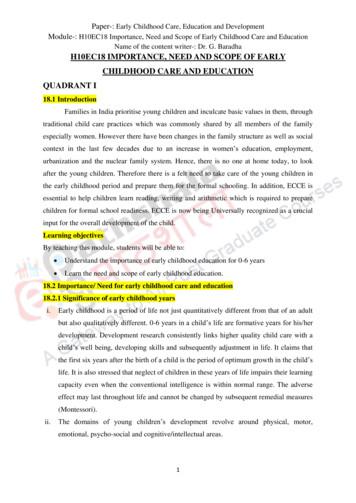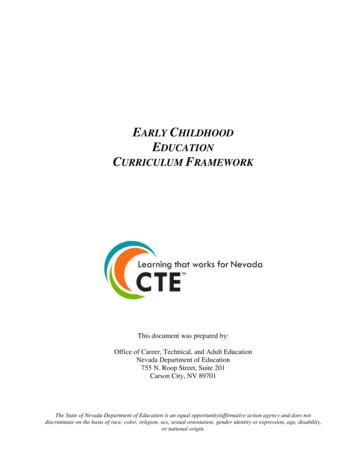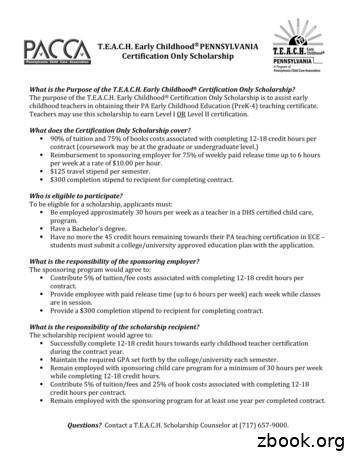Early Childhood Education And Care - Edexcel
PearsonHigher Nationals inEarly ChildhoodEducation and CareQualification GuideFirst Teaching from January 2019First Certification from 2020Issue NationalDiploma
Introducing your new Pearson BTECHigher Nationals in Early ChildhoodEducation and CareBTEC is the world’s most successful and best-loved applied learning brand,engaging students in practical, interpersonal and thinking skills for more thanthirty years.Pearson BTECs are work-related qualifications for students taking their firststeps into employment or those already in employment and seeking careerdevelopment opportunities. Pearson BTECs provide progression into theworkplace either directly or via study at university and are also designedto meet employer’s needs. Pearson BTEC Higher National qualifications aretherefore widely recognized by industry and higher education as the principaltechnical professional qualification at Levels 4 and 5.The Pearson BTEC HigherNational Certificate (HNC) is atlevel 4 (the same as the first yearof a UK honours degree).The Pearson BTEC HigherNational Diploma (HND) is at level4 and level 5 (the same as the firsttwo years of a UK honours degree).A word from the Subject expertIt’s with great pleasure that I introduce the new Higher National in Early Childhood Educationand Care programme. Having taught and worked in education for many years, I’ve beenprivileged to see first hand the life changing opportunities education and training can provide,and the difference well-educated and trained practitioners can make to the lives of children.With this in mind, the new Higher National qualifications in Early Childhood Education andCare take a rigorous and innovative approach, designed to produce confident, compassionate,competent and highly knowledgeable advanced practitioners.The integrated academic and professional practice elements in these qualifications provide a thorough spring-boardfor students to progress into sector-related degree programmes and senior leadership or management roles in earlyeducation and care.The programme is more aligned to UKHE and new up-to-date content will make it both a stimulating and excitingexperience for students and teachers. You can deliver with confidence a work-integrated programme that will prepareand equip students for the world of work, and develop them as ethical champions for children.I am here to provide guidance, advice and support on every aspect of the programme and its implementation and willwelcome your views and feedback. I will be posting news and updates on the HN Global forum so please get registeredand join the online discussions.I look forward to working with you!AdeProfessional courses developedcollaboratively with subject expertsDeveloped in consultation with higher education institutions, employers, professionalbodies, colleges and students, the Higher Nationals are designed with a child-centredpractice focus that meet sector-specific requirements and professional standards, as wellas offering clear and occupationally-relevant progression routes. The result is dynamictechnical qualifications that are recognised by employers and universities, that developstudents’ academic skills and abilities as well as their work‑readiness and practice skills.The objectives of the redevelopment of the BTEC Higher Nationals have been to ensure: employer engagement; work relatedness; opportunities for progression to further higher education; alignment with UK higher education expectations; and qualifications which are up to date with current professional practice and include professionalaccreditation and opportunities to gain vendor certification where possible.What’s new?For your new Pearson BTEC Higher National qualifications in Early Childhood Education and Care,we are building on what you’ve told us you value most: Essential subject knowledge needed by students to progress successfully into further study orto the world of work or continued employment; A simplified structure students undertake a substantial core of learning, required by allpractitioners in early education and care at Level 4, building on this at Level 5, with specialistand optional units linked to students’ specialist area of study; Three specialist pathways and one general pathway at Level 5 so there is something to suiteach student’s preference for study and future progression plans; Refreshed content that is closely aligned with professional bodies’, employers’ and highereducation needs for a skilled future workforce; Assessments that consider cognitive skills (what students know) along with affective andpsychomotor skills (what they can do and how they behave); An assessment strategy that supports progression to Level 6 studies and also allows centresto offer assessment relevant to the local employers, thereby accommodating and enhancingdifferent learning styles; Learning outcomes mapped against professional body and apprenticeship standards, and thatare work-integrated where appropriate; Mandatory work placement or experience to support students’ learning in and from practice A thematic approach to learning and assessment reflecting the values and principles of aneffective early childhood practitioner Unit-specific grading and Pearson-set assignments Robust quality assurance measures that serve to ensure that all stakeholders (e.g. professionalbodies, universities, employers, centres and students) can feel confident in the integrity andvalue of the qualification.
Flexible choice of subject areasand progression opportunitiesThe new HNC and HND qualifications in Early Childhood Education and Care offer ageneral pathway at Levels 4 and 5, and the choice of three specialist pathways at Level 5HND, with a range of specialist and optional units. Specialist pathways at HND are: Education Leadership and Management Social and Community Care PracticeEach Higher National unit has a clear purpose: to cater for the increasing need for highquality professional and technical education pathways at levels 4 and 5, providingstudents with a clear line of sight to employment or progression to a degree at level 6.The Higher National Certificate (HNC) is a Level 4 qualification made up of 120 credits. Itis usually studied full-time over one year, or part-time over two years.The Higher National Diploma (HND) is a Level 4 and Level 5 qualification made up of 240credits. It is usually studied full-time over two years, or part-time over four years.BTEC Higher Nationals consist of core units, specialist units and optional units: Core units are mandatory Specialist units are designed to provide a specific occupational focus to thequalification and are aligned to Professional Body standards Required combinations of optional units are clearly set out in the tables.Pearson BTEC Level 4 Higher National Certificate in Early Childhood Educationand CareEarly Childhood Education and CareMandatory units1 Personal and Professional Development through Reflective Practice2 Protecting Children in Early Childhood Education and CareEnvironments3 Play and Learning in Early Childhood4 Supporting and Promoting Children's Development(Babies and Toddlers)5 Supporting and Promoting Children's Development (Young Children)6 Promoting Healthy Living7 Preparing for Research (PEARSON-SET UNIT)8 Promoting Inclusive Early Childhood Education and CareEnvironmentsCore UnitsSpecialist UnitsOptional UnitsWork placement requirements:The Total Qualification Time for the Pearson BTEC Level 4 Higher National Certificate in Early Childhood Education and Care includes arequirement of 375 hours’ work placement or experience in children’s early care and/or education settings over the one-year period ofthe qualification. Further details of the requirements are in the specification on the Pearson qualifications website.
Flexible choice of subject areasand progression opportunitiesPearson BTEC Level 5 Higher National Diploma in Early Childhood Educationand CareEarly Childhood Education and CareAll Level 4 mandatory units from Level 49 Investigating Childhood: Action Researchfor Early Childhood Practitioners (Pearson-setProject)10 Improving Quality in Early Childhood Educationand Care Environments29 Innovative Approaches to Children’s Play andLearning in PracticeOptional Level 5 UnitsPlus an additional 45 Credits which can beselected from the specialist and optional unitsgiven below.Early Childhood Education and Care(Education)Optional Level 5 Unit BankAll Level 4 mandatory units from Level 412 Child-centred Practice with Children, Families and Communities9 Investigating Childhood: Action Researchfor Early Childhood Practitioners (Pearson-setProject)13 Supporting Social Work with Children and Families10 Improving Quality in Early Childhood Educationand Care EnvironmentsSpecialist Units * (Specialist units also available as an Optional units)14 Impact of Curriculum on Early Childhood Education and Care18 Social Policy: Influences on Practice and Provision23 Managing and Leading People in Children’s Early Education and Care Environments14 Impact of Curriculum on Early ChildhoodEducation and Care24 Managing Children’s Early Education and Care Environments29 Innovative Approaches to Children’s Play andLearning in Practice29 Innovative Approaches to Children’s Play and Learning in PracticeOptional Level 5 UnitsPlus an additional 30 Credits which can beselected from the specialist and optional unitsgiven below.25 Mentoring and Supervision in Early Education and Care PracticeCore UnitsSpecialist UnitsOptional UnitsEarly Childhood Education and Care(Leadership and Management)Early Childhood Education and Care(Social and Community Care Practice)Optional Level 5 Unit BankAll Level 4 mandatory units from Level 4All Level 4 mandatory units from Level 411 Current & Emerging Pedagogies in Early Childhood Education and Care9 Investigating Childhood: Action Researchfor Early Childhood Practitioners (Pearson-setProject)9 Investigating Childhood: Action Researchfor Early Childhood Practitioners (Pearson-setProject)15 Approaches to Entrepreneurship in Early Childhood Education and Care10 Improving Quality in Early Childhood Educationand Care Environments10 Improving Quality in Early Childhood Educationand Care Environments17 Advanced Practice in Safeguarding and Child Protection for the Early Childhood, Education and CarePractitioner23 Managing and Leading People in Children’sEarly Education and Care Environments12 Child-centred Practice with Children, Familiesand Communities19 Supporting Children in Home-based Childcare Environments24 Managing Children’s Early Education and CareEnvironments13 Supporting Social Work with Children andFamilies21 Trauma in Childhood: Addressing the Impact of Adverse Experiences on Child Health and Wellbeing25 Mentoring and Supervision in Early Educationand Care Practice18 Social Policy: Influences on Practice andProvision26 Healthcare PlayOptional Level 5 UnitsOptional Level 5 UnitsPlus an additional 30 Credits which can beselected from the specialist and optional unitsgiven below.Plus an additional 30 Credits which can beselected from the specialist and optional unitsgiven below.*Please note that only one specialist unit can be selected from each pathway group.Work placement requirements:The Total Qualification Time for the Pearson BTEC Level 5 Higher National Diploma in Early Childhood Education and Care includes arequirement of 525 cumulative hours’ work placement or experience in children’s early care and/or education settings over the two-yearperiod of the qualification. Further details of the requirements are in the specification on the Pearson qualifications website.Optional Units16 The Impact of Contemporary Global Issues on Children's Health and Wellbeing20 Health Education and Promotion in Action: Developing the Healthy Child22 Supporting Children’s Medical Needs27 Outdoor Play and Learning28 Comparative Education Systems: International Perspectives30 Working in Partnership across Health, Education and Care Services
Progressionopportunities:The purpose of Pearson BTEC HigherNationals in Early Childhood Education andCare is to develop students as professional,self-reflecting individuals, able to meet thedemands of employers in early educationand care, and adapt to a constantlychanging world. The qualifications aimto widen access to higher education andenhance the career prospects of thosewho undertake them, including throughapprenticeship routes.On successful completion of the Level 5Higher National Diploma, students candevelop their careers in early educationand care through: Entering employment; Continuing existing employment; Committing to Continuing ProfessionalDevelopment (CPD); Completing a Higher Apprenticeship Progressing to university.Qualifications in Early Childhood Educationand Care within the UK are referencedagainst National Occupational Standardsin Early Years Education, Childminding andDaycare and Children’s Care, Learning andDevelopment (Management), as well asapplicable apprenticeship Standards.Level 4Level 5Pearson BTEC Level5 Higher NationalDiploma in EarlyChildhood Educationand CarePearson BTEC Level4 Higher NationalCertificate in EarlyChildhood Educationand CareLevel 6 BA/BSc (Hons)DegreePearson BTEC Level5 Higher NationalDiploma in EarlyChildhood Educationand Care (Education)Pearson BTEC Level5 Higher NationalDiploma in EarlyChildhood Educationand Care (Leadershipand Management)Pearson BTEC Level5 Higher NationalDiploma in EarlyChildhood Educationand Care (Socialand CommunityCare Practice)In England, these qualifications can be taken aspart of an Apprenticeship Programme. See websitefor details.Employment / CareerProgression
Assessment StrategyResourcesPearson BTECs combine a student-centred approach with a flexible, unit-based structure.Students are required to apply their knowledge and skills to a variety of assignments andactivities, with a focus on the holistic development of practical, interpersonal and higherlevel thinking skills. Assessment reflects not only what the student knows but also whathe or she can do to succeed in employment and higher education in an ethical manner.We are providing a wealth of support to ensure that tutors and students have the bestpossible experience during their course. We have worked with students and tutorsworldwide to create an effective and interactive community for our qualifications, calledHN Global, an exciting new online platform created by Pearson to engage with HigherNational students and tutors around the world.Pearson BTEC Higher Nationals have always allowed for a variety of forms of assessmentevidence to be used, provided they are suited to the type of learning outcomes beingassessed. For many units, the practical demonstration of skills is necessary and, for others,students will need to carry out their own research and analysis, working independently oras part of a team.Created in parallel with the development of the new BTEC Higher National qualifications,HN Global houses a great number of resources for students to get the most out of theirBTEC Higher National experience.Pearson also offer Study Skills units to all learners an online toolkit accessed on HNGlobal that supports the delivery, assessment and quality assurance of BTECs in centres.www.highernationals.comDo you need centre approval?Providers wishing to deliver the new Pearson BTEC Higher Nationalqualifications (Pearson BTEC Higher Nationals in Early ChildhoodEducation and Care - first teaching january 2019) will be subject to anew qualification approval process, more aligned with that used inUK Higher Education. Email hnqa@pearson.com or visit qualifications.pearson.com/higher-nationals for more information about the process.
FAQs1. If a provider is already delivering the existingHigher National in Advanced Practice in Early YearsEducation qualifications do they still need to obtainapproval for delivering the new qualification?Yes, existing providers would still be requiredto gain approval for delivering the new HigherNational qualification but the process will besimplified for centres that meet the auto approvalcriteria. Approval will then be provisionally grantedsubject to the return of a signed declaration andpayment of the approval fee. More details can befound in the support section of our website(http://qualifications.pearson.com/).2. How long will the approval process take?This will depend on whether the provider is eligiblefor auto approval. Once an existing provider has beennotified of eligibility for auto approval, the approvalwill remain provisional until the provider returnsthe signed declaration and approval. If an existingprovider is ineligible and requires a desk based review,the review cannot begin until the provider confirmsits intention to proceed and the approval fee is paid.New providers will go through the standard providerapproval process which currently takes about 20 days.3. Is it possible for students to change theirpathway at the end of their first year on thecourse programme?Yes it is. Providers will need to advise Pearsonregistrations team and they will be able totransfer the student’s registration to theappropriate pathway.4. If Pearson are providing Example AssessmentBriefs, do providers still have to devise their ownassignments and complete internal verification ofassignments?Yes they do. Example Assessment Briefs are forguidance and support only and can be customisedand amended according to localised needs andrequirements. All assignments must still bemoderated as per the internal verification process.5. How will providers know what the accreditationrequirements are for Professional Bodies and whatstudents would need to do to claim Accreditation.There will be further details and guidance forproviders available on the Pearson qualificationswebsite (http://qualifications.pearson.com/).
com/higher-nationalsImagesCover: shutterstock - Rawpixel.comp4: shutterstock - DGLimagesp8: shutterstock - Wallenrockp10-11: shutterstock - Rawpixel.comp12-13: shutterstock - weedezign
11 Current & Emerging Pedagogies in Early Childhood Education and Care 15 Approaches to Entrepreneurship in Early Childhood Education and Care 16 The Impact of Contemporary Global Issues on Children's Health and Wellbeing 17 Advanced Practice in Safeguarding and Child Protection for the Early Childhood, Education and Care Practitioner
Understand the importance of early childhood education for 0-6 years Learn the need and scope of early childhood education. 18.2 Importance/ Need for early childhood care and education 18.2.1 Significance of early childhood years i. Early childhood is a period of life not just quantitatively different from that of an adult
Early Childhood Care, Development and Education (ECCDE) is a term that is used interchangeably worldwide but refers to the same concept of early childhood education and cognitive development. The World Bank for instance refers to it as Early Childhood Care and Education, whereas UNESCO refers to it as Early Childhood Development Care.
ECE 240 - Administration of Early Childhood Care and Education Programs (3) ECE 241 - Administration: Human Relations for Early Childhood Education (3) Colorado Mesa University B.A. Early Childhood Education - Early Childhood Special Education Advisor: Vail Shoultz-McCole vshoultz@coloradomesa.edu 970-255-2674
Early Childhood Education I L1 Early Childhood Education II L2 Early Childhood Education III L3C Early Childhood Education Advanced Studies AS The core course sequencing with the complementary courses provided in the following table serves as a guide to schools for their programs of study.
Section 15- Service providers operating early childhood education and care centres must be licensed (1) A service provider who operates an early childhood education and care centre must be licensed in accordance with regulations made under section 636. (2) A licensed early childhood education and care centre may be operated within the premises of a
Early Childhood Care Education - Early Childhood Care Education (ECCE) Centres in this Policy will be referred to as pre-school or Kindergarten. At present in Vanuatu Early Childhood Care & Education [ECCE] is synonymous with Pre-School [4 - 6 year olds]. However, internationally the term ECC
T.E.A.C.H. Early Childhoodâ PENNSYLVANIA Certification Only Scholarship What is the Purpose of the T.E.A.C.H. Early Childhood Certification Only Scholarship? The purpose of the T.E.A.C.H. Early Childhood Certification Only Scholarship is to assist early childhood teachers in obtaining their PA Early Childhood Education (PreK-4) teaching certificate.
well as themes from PALS enquiries and formal complaints received within Western Sussex Hospitals NHS Trust during 2018. Patient experience monthly reports are provided to operational teams and patient comments are automatically shared with our staff. Leaders of our clinical services use the feedback we receive from patients to shape quality improvement activities at ward level and see whether .























